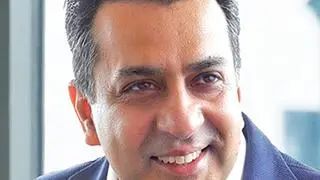When an infant takes ill, he/she is taken to a paediatrician, when a pet suffers, it is taken to a veterinary doctor in the neighbourhood. What happens when the plants that you fondly grow in your garden refuse to flower? Most of us would go to a nursery, explain the problem, buy the plant nutrient and apply it. There ends the matter.
But what if the area under consideration is more than a mere kitchen garden, in fact, a farmland?
In the good old days, by way of finding solutions, most farmers applied organic manure besides taking advice from input dealers in their respective areas. “At times, their recommendations proved effective in controlling the pest menace. If it did not help, they would recommend some other composition, albeit for cash. Since these dealers were close at hand for advice, there was some comfort,” recalls Sakthivel, a coconut farmer in Aliyar.
Sakthivel, and a couple of other farmers eWorld met, also remember tuning into lessons on farming on ‘All India Radio'. Then came the TV channel (Doordarshan) that aired similar programmes.
“But these were lessons, not prescriptions, for the problem on hand,” says Marimuthu, another farmer near Sultanpet.
But all that is in the past. Today, when faced with a pest menace on the field or a similar issue, farmers can turn to technology for help.
With the Tamil Nadu Agricultural University applying Information and Communication Technology (ICT) to render timely, cost-effective and quality extension service to the farming community, the e-Velanmai model has become a hit in this part of the country.
Online advice
“Information delivery has always been a problem as there are over 82 lakh farmers (in Tamil Nadu alone) compared with a couple of thousands of extension workers.
This gap in the farmer-to-extension-workers ratio is so large that the transfer of technology from lab to land seemed a failure. Due to resource constraint, the University is not in a position to appoint extension workers,' explains Dr C Karthikeyan, Principal Investigator, e-Velanmai project.
“Given the problems the extension agents and researchers face in facilitating direct contact with the farming community, and considering the complexity of agriculture, the use of multi disciplinary expertise/specialists such as plant pathologist and entomologist has become absolutely important,” asserts the Vice-Chancellor of the Farm Varsity, Dr Murugesa Boopathi.
The pilot run of this ICT-based project, was in the three sub-basins — Aliyar, Paalar and Varahanadhi — between 2007 and 2010. The project has been implemented with the support of the World Bank-aided TN - IAMWARM (Tamil Nadu Irrigated Agriculture Modernisation and Water Bodies Restoration and Management).
According to Karthikeyan, over 1,200 farmers have enrolled by paying a membership fee of between Rs 50 and Rs 300, depending on the farm size. Expert suggestions numbering around 1,250 have been offered to solve problems.
How the process works
The University is now preparing to upscale the e-Velanmai project to cover 14 other districts in the State.
Here's how ICT-aided farming works: When a farmer spots something amiss in his field, all he needs to do is alert the field staff on his mobile.
The extension agent arrives at the spot within two hours or even earlier, inspects the farmer's field and frames digital images of the damaged parts of the crop, uploads these pictures on a laptop and transmits them to the expert team at TNAU.
Normally the photos are uploaded for advice during the first half of the day. The team then analyses the symptoms and offers technical advice to the field staff or farmer within three hours of receipt of the mail.
The advice is documented on the membership card. “Recording the advice on the card ensures accountability,” the Project Investigator explains.
In this demand-driven participatory technology-transfer approach, the field staff are given digital camera, laptop, Internet access, and mobile phone.
For Sakthivel and Marimuthu, e-Velanmai is a boon.
“We were unable to get timely and appropriate advice till recently. Now, the scientists take only a couple of hours to respond and the advice is documented. Why should we look for over-the-counter cure when we can get the doctor to attend at our doorstep?” They point out that the charges are not high. They also want the research community to teach them to shoot the pictures and upload them.
Now the farmers are totally dependent on the extension staff, says Dr Karthikeyan.
Prompt, on-site service, from thousands of miles away. That is what technology has facilitated. No wonder these farmers are keen to plant more technology in their fields.








Comments
Comments have to be in English, and in full sentences. They cannot be abusive or personal. Please abide by our community guidelines for posting your comments.
We have migrated to a new commenting platform. If you are already a registered user of TheHindu Businessline and logged in, you may continue to engage with our articles. If you do not have an account please register and login to post comments. Users can access their older comments by logging into their accounts on Vuukle.